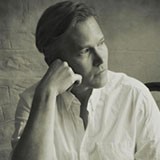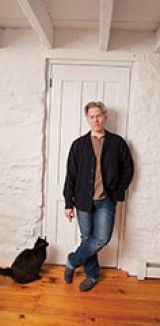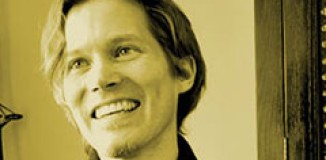MARK WUNDERLICH was born in Winona, Minnesota and grew up in rural Fountain City, Wisconsin. His first book, The Anchorage, was published in 1999 by the University of Massachusetts Press, and received the Lambda Literary Award. Voluntary Servitude was published in 2004 and The Earth Avails, both by Graywolf. He has published poems in The Paris Review, Yale Review, Slate, Tin House, Poetry, Ploughshares, Boston Review and elsewhere. His work has been included in over thirty anthologies and has been featured on NPR’s All Things Considered. His work has been translated into Italian, Bulgarian and Swedish. Wunderlich has taught in the graduate writing programs at Columbia University, Sarah Lawrence College, Ohio University and San Francisco State University. He has taught undergraduate writing and literature courses at Stanford University, Barnard College and Stonehill College. Since 2003 he has been a member of the Literature Faculty at Bennington College in Vermont. Wunderlich lives in New York’s Hudson Valley near the village of Catskill.
Read Nina Shengold’s Chronogram profile.
“Rhythm & Image” 9/18/14 – The Exercises
At our third class, the delightful Mark Wunderlich read four poems from The Earth Avails (Graywolf, 2014) and a new poem he wrote this summer. He talked about his writing process (it involves a lot of getting up and washing dishes, going back to work, splitting kindling, going back to work) and how poetry involves breath and music. “Whenever we speak, we’re singing to each other.”


Mark Wunderlich

Mark Wunderlich
It’s also a visual form. Mark pointed out that prose is fluid, flowing from margin to margin, where poetic lines are specific. They don’t “break” so much as “breathe.”
MARK’S EXERCISE:
Imagine a place from your past and spend five minutes listing favorite words you associate with it. (Examples from his family farm: muskrat/chokecherry/milk pail.) Don’t overthink or censor yourself. Keep your pen moving constantly. If you can’t think of the next word, keep writing the same one till a new one comes to you.
Choose ten favorite words from this list and print them on a separate sheet of paper.
Now trade pages with someone you don’t know. You have ten minutes to write a poem using all ten of the words you’ve been given. Go.
NINA’S EXERCISE:
Describe something you find beautiful in as much detail as you can, without using any adverbs or adjectives. (Examples: it can’t be “big,” but it can dominate the room. It can’t be “green,” but it can smell like pine.) Ten minutes.
Both exercises impose limitations (time limit, rules about what words you must or can’t use). Mark observed that writers can become overly invested in producing a product–a finished thing–and lose their sense of playfulness, invention, and accident. “All of poetry is a conversation between freedom and restraint,” he said. “When you engage the good soldier with rules and patterns, the reptile part–the id, the wild woman–gets to come out and do its thing.”
He also proposed some uses for “those little notebooks people always give you as gifts when they know you’re a writer”:
— A book of possible titles
— A book of quotations and overheard dialogue
— A “good lines” box for things you wind up cutting: Recycle your darlings.
If you can’t clear the decks to give yourself uninterrupted blocks of writing time, you can always find 20 minutes to check in with your creative work. Make lists, do exercises, get something started.